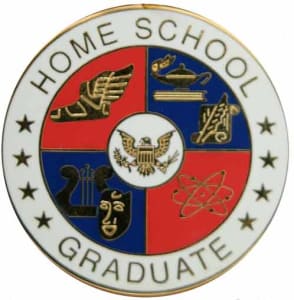Choosing a college your homeschool Grad will love
The homeschooling movement is growing in America, and it’s no surprise. The home is rich, natural soil for student learning. Even with public and private school students, parents remain a powerful force in the education of their children.
For most of history, children received vocational or advanced training in small, community settings such as apprenticeships or with home tutors. While regular teachers can tout their certificates and degrees in specialized fields, evidence confirms that homeschool curricula, with the freedom of the homeschool environment along with the security and care of parent-teachers, typically outperform classrooms taught by degreed professionals.
In short, the passion and dedication of parents seems to matter more than “professional expertise.” And of course, the disarray of public schools and the added expense of private schools only add to homeschooling’s appeal.
But what about after high school? The working world still presses job candidates for college degrees. College remains crucial for many Americans. But for homeschoolers, some colleges fit far better than others. Below is TheBestSchools.org’s ranking of the 30 top homeschool-friendly colleges.
Featured Schools
 Like anyone else in the college hunt, homeschoolers want academic excellence and rigor at a fair price — but in a healthy setting without the decadence prevalent in so much of American higher education. In their search for the right college, homeschoolers have unique needs.
Like anyone else in the college hunt, homeschoolers want academic excellence and rigor at a fair price — but in a healthy setting without the decadence prevalent in so much of American higher education. In their search for the right college, homeschoolers have unique needs.
It is not enough to find a college that actively recruits homeschoolers; those schools might still fail to address the needs and interests of their homeschool applicants. All of the following schools have a history of accepting homeschool applicants. But we’ve gone farther in identifying three key features that commend these schools as “homeschool-friendly:”
The Best Colleges for Homeschool Graduates
Jump to our three criteria for this list.
We use trusted sources like
Peterson's Data and
the National Center for Education Statistics to inform the data for these schools.
#1 The Best Colleges for Homeschool Graduates
Toccoa Falls College
Toccoa Falls, GA - 4 years
- Online + Campus
Toccoa Falls College offers a variety of options for busy students. Learners enrolled at the private institution take classes on campus and online. At the school, 42% of programs are available online.
Undergraduates enroll in 31 bachelor's programs, including 10 online bachelor's programs. Both modalities prioritize academic rigor while providing a supportive learning community. Faculty mentors and academic advisors work with degree-seekers to create an individualized course of study. Learners benefit from institutional resources such as career workshops, mock interviews, and job fairs. The undergraduate graduation rate is currently 46%.
Prospective students benefit from the financial aid office, which provides guidance on funding opportunities. Currently, 82% receive some form of financial aid.
Caveat Emptor
Ivy League Schools
Who would not want their children to attend top-tiered schools such as those of the Ivy League: Harvard, Yale, Princeton, Brown, Cornell, Dartmouth, or the University of Pennsylvania? Even homeschoolers can rationalize attending these schools since all of them (except Cornell) have Christian historical roots, Christian mottos and logos, and even Christian clubs.
But these schools present significant pitfalls to incoming students, especially homeschool students. No school is free of temptations, but these are more dangerous than others because the university culture is so heavily slanted against the social, political, and theological values that homeschoolers are likely to bring to campus. Instead, these schools are so bent on overexposing students to radical and fringe ideas that students can readily lose their bearings.
These schools are academically prestigious, but “loss-of-faith” stories about their graduates are too numerous to recount. These schools are tempting to successful students — successful homeschooled students may even be actively recruited by these schools. But for the homeschooling community these schools can be as toxic as they are tempting.
For the homeschool graduates with the maturity, intellect, and apologetics skill set to handle attending such schools, they should expect to have their faith questioned and challenged on a near-daily basis. Their family values will be flooded with incompatible values and ideas. They will have to manifest grace, patience, love, and diligence on all sides, if only to earn enough respect to have their views tolerated within an otherwise hostile environment.
Also, they will do well to associate with such groups as Veritas Forum, Ratio Christi, Reasonable Faith, Campus Crusade, Campus Outreach, and Baptist Collegiate Ministries, as well as with theologically sound local churches and the scant sampling of professors who remain solid and unashamed in their Christian faith.
If homeschooled students can stand fast through the battering they will receive at these schools, they will be the better for it. If they can’t, they will be swept away. Seek out the wisdom of parents, teachers, counselors, and alums in determining whether the Ivy League is right for you.
Baylor University
Waco, Texas
Baylor is a historically Baptist school with great name-recognition, a strong graduate program, and is fairly prestigious among Christian colleges. Baylor is a rising academic heavyweight whose NCAA-Division 1 athletics are nationally renowned. The 2012 Heisman Trophy winner Robert Lee Griffin III is a Baylor grad. And Baylor has recent national championships in women’s Basketball (2012), Track and Field (2014) and Gymnastics (2014). Baylor is kind of like a younger, protestant, Texan form of Notre Dame.
Unfortunately, the school has some glaring setbacks that keep this impressive school off the list. It’s the most expensive school so far mentioned, at almost $60,000 per year for attendance. The size of the school, almost 17,000, is also a detriment to homeschoolers who tend to favor small class settings.
Baylor was once a Southern Baptist affiliate, but now affiliates with the Baptist General Convention of Texas. The school’s greatest strengths seem to be sports, and academic reputation. Baylor really does offer a lot of Christian options on campus through clubs and classes. The surrounding town of Waco, Texas is fairly conservative and Christian. Baylor is still not an evangelism hub like Wheaton, or a conservative Christian think-tank like Grove City College, or a Christian homeschool haven like Patrick Henry college. Students do not have to sign any doctrinal confessional statement.
Furman University
Greenville, South Carolina
Also a former Southern Baptist School, Furman University was affiliated with the Southern Baptist Convention until 1992. Furman can now been seen as pushing academic pluralism (a valuable component of academic freedom), as well as religious and ideological pluralism, attempting to give equal respect to all religions.
Furman aspires to become a leading Ivy League-style school for the Southeast, having more Ph.D.s’s than any other liberal arts school in the region. Furman is an academic heavyweight and prospective homeschoolers should approach this school like they would an Ivy League school. They should not expect much cultural reinforcement to support or strengthen their faith. Quite the opposite, they should expect the classrooms and culture to be hostile towards intelligent design, creationism, Biblical inerrancy, and some traditional family values.
For some homeschoolers, those tradeoffs are worthwhile given the school’s academic prestige, the beautiful campus, and the strong name-recognition of this elite school.
Bob Jones University
Greenville, South Carolina
Perhaps the strongest reason parents may want to send their homeschool graduates to Bob Jones University is that it seems doctrinally “safe,” taking strong stands on several key evangelical issues such as Biblical inerrancy, creation, traditional marriage, etc. To many parents, Bob Jones has the appearance of a homeschool extension campus.
However, for some, Bob Jones takes its fundamentalism to troubling lengths. Its Christian education is compromised by undue suspicion of psychology, philosophy, and the Great Books, manifesting as poor integration of faith and learning. And Bob Jones is overly pietistic. For example, the 2011–12 student handbook says, “Students are to avoid any types of entertainment that could be considered immodest or that contain profanity, scatological realism, sexual perversion, erotic realism, lurid violence, occultism, and false philosophical or religious assumptions.” Ironically, the Bible includes all of these elements, and so students are either not allowed to read the Bible or are not allowed to be entertained by the Bible.
R-rated movies are prohibited. There is an 11 pm curfew, with 12 pm lights-out across all dormitories. All students must live in campus dormitories or with their family. Also, while the school does not endorse a “King James only” doctrine, it is commonly known to have fostered several other tenets of hyper-fundamentalism.
For some students, the strict rules and firm convictions may suit them just right. In general, however, the university culture is legalistic, hyper-fundamentalist, insecure, and generally not recommended for graduating homeschool students.
Return to the topNon-Christian College Options for Homeschoolers
If you are a homeschooler looking for non-Christian, secular, or politically liberal college settings then your options are wide open. Most of the options above will suit you fine, provided the school doesn’t require a “statement of faith” from students, and assuming secular students can handle some Christian and conservative trends in the campus culture. But if you are looking for schools where the professors are openly left-wing in their politics, or the campus culture is explicitly non-religious or just non-Christian, then the options increase exponentially.
Ivy League Colleges
Ivy League schools are a serious option if you can secure the funding, and you have no objections to their socio-political culture. The Ivy League schools officially include Harvard, Princeton, Cornell, Brown, Columbia, Dartmouth, Yale, and the University of Pennsylvania. According to Chris Weller of Business Insider, homeschooling can offer a competitive advantage when applying to elite schools. Savvy homeschoolers can surpass their conventionally schooled peers by spending more time outside the classroom, building a well-rounded portfolio, exempting (“testing-out of”) college classes, and mastering skills and subjects that aren’t even offered at the local school. For these reasons, Weller reports, Ivy League and other prestigious schools like MIT, Stanford, and Duke University actively recruit homeschoolers.
The Ivy League schools tout the best educational reputations in the world, and their price reflects that fact. Some of that reputation, however, is disputable. Savvy students can get a comparable education elsewhere, for cheaper, but only by sacrificing the prestigious name-brand. Name-recognition is a big deal though; it goes a long way towards future employment, social networking, and career opportunities.
Private Secular Colleges
If you are aren’t sold on Ivy League schools, perhaps they are cost prohibitive or perhaps you’re seeking a school closer to home, then homeschool graduates should typically consider other private school options next before they look to public schools. Compared to public schools, private schools offer the better combination of small but lovely campuses, small enrollment, and smaller classrooms. Some of the stand out private schools with a secular or non-Christian reputation are Vassar College, Lewis and Clark College, Pomona College, Reed College, and Bard College.
Private Christian Colleges
We should also mention that most of the moderately prestigious Christian schools pose no threat to secular and non-Christian students. They’ll serve non-Christian homeschool graduates just fine. Georgetown University and Notre Dame are catholic schools. Furman University has a Baptist background. And Davidson College is Presbyterian. And these school are highly esteemed academically, yet they pose no significant religious threat to secular and non-Christian students. Take for example, the Church of Christ denominational school Pepper dine University. Though this Malibu California based school is, quite possibly, more religiously oriented than the schools just mentioned, They do not require a statement of faith among their students. Non-Christian, secular, and socially-liberal clubs abound on campus. The campus culture tends to be socially and politically moderate to left wing, as opposed to “fundamentalist” or “right-wing nuts.” The school even withdrew their Title IX exemption status, effectively signaling a peace-offering towards the LGBTQ advocacy groups, and forging friendlier ties with the political and secular left.
Public/State Colleges
If none of those options appeal to you, then you may want the convenience and cost-benefit of public college. With public colleges and universities, A.K.A. “State Schools,” the tuition is generally lower than private schools, and lower still for in-state residents. Some of the leading public colleges like William and Mary, Texas A&M, UC Berkeley, UCLA, UVA, and UNC offer comparable status to leading private and Ivy League schools. For many a homeschooler, state schools are a live option although their size and culture can be intimidating. Homeschoolers can avoid some of these pitfalls with a little advanced planning.
Return to the topCollege Advice for Homeschoolers
Exempt as Many Classes as You Can
This advice serves two purposes. First you can save money with each class you don’t have to take in college. That’s money saved for graduate school, for living expenses, or just for a rainy day later. Second, you will be exempting the “big classes,” the introductory level (101 and 102 level) courses that cram 300 students into a lecture hall, have no time-with-teacher opportunities, and are taught by teacher assistants more than the professor, which can be good or bad depending on the TA. “Mega-classes” can be intimidating, but at the same time, they are often the most well-presented lectures performed by some of the schools’ biggest names.
Stay in-State
Choosing an in-state school provides the obvious benefit of keeping costs down. In-state tuition is typically 20–50% lower than for out-of-state students. Moreover, this option gives students the leisure to stay in better touch with their families and hometown. Homeschoolers often have deep social ties to their family and community. For this reason, transitioning into a big, distant, state school can be more traumatic for homeschool students than other students. Going to an in-state school can help students to stay visiting-distance from their family and hometown, or perhaps even commuting distance
Commute
This tip is two-fold. First, you can save lots of money this way. Room and board typically chews up 25–35% of your college expenses, unless you commute. Don’t worry about “missing out” on campus life either. You can still partake of campus events if you check the campus postings. As for quality meal time with other students, you can still get a 5-meal (per week) plan and do lunch or the occasional breakfast with other students, or just pay-per-meal to spend some quality time with classmates in the cafeteria after class. Second, commuting allows you to avoid the swamping gargantuosity of big state colleges. Homeschoolers often struggle to cope with the sheer size and social-inundation of college life. Commuting allows you to sample that culture at your own pace, and as you choose, without having to live in it all day every day.
Consider Alternatives: Online College, Community College, and Junior College
If the elite schools aren’t in the cards for you, then quite possibly you are trying to keep costs down and your realistic educational options are in that murky middle-range where the same quality of education could cost six figures or four figures, depending on how you manage your options. If that’s where you are at, then you have a lot of educational options to help keep costs down. Online college is a great option for non-traditional students, married students, and part-time students. Many community and junior colleges are good options for students to keep the costs down for the first two years of school — perhaps acquiring an associate degree — before transferring to a more “recognized” state school. Plus, community and junior often allow high schoolers to take classes for credit, a smart option for mature homeschoolers.
Return to the topCriteria
Christian Education
 Not all homeschools are Christian, or even religious. If that’s you, we have some college recommendations just for you. But most homeschool families are Christian, and that creates a unique problem when it comes to college. Christian schools allow open debate of contrary views without belittling nay-sayers or coercing conformity, and without compromising Christian integrity.
Not all homeschools are Christian, or even religious. If that’s you, we have some college recommendations just for you. But most homeschool families are Christian, and that creates a unique problem when it comes to college. Christian schools allow open debate of contrary views without belittling nay-sayers or coercing conformity, and without compromising Christian integrity.
Christian education sees students as image-bearers of God, holistic individuals having both a soul and a body and possessing built-in purposes such as love, discovery, creativity, wisdom, and responsibility.
Thus, a solid Christian education should be strong in the humanities, raising students within some of the great traditions, experiences, and conversations across human history. It is these grand meta-narratives that lend counsel and context for students as they become active participants and contributors to the human project. Overly pragmatic or secular-leaning schools can treat students merely as sophisticated animals, workers, robots, or stimulus-response mechanisms. Christian education should attempt to spare students from such debasement.
Socio-Political Conservatism
 Often homeschoolers come from settings with strong traditional family values and from politically right-leaning homes.
Often homeschoolers come from settings with strong traditional family values and from politically right-leaning homes.
American colleges, however, lean overwhelmingly towards social liberalism and the political left. It can be difficult to find an academically respectable college that is not hostile to conservatives.
While it is not necessary to find a “conservative” school per se, the school must be hospitable to conservative values to make this list.
Schools get high marks here if they have outstanding reputations for their political science departments, law schools, or institutes promoting distinctly conservative values and policy.
Science and Faith Integration
 Upon going to college, homeschoolers are often shocked to find that their science classes take positions openly hostile to their Christian faith.
Upon going to college, homeschoolers are often shocked to find that their science classes take positions openly hostile to their Christian faith.
Psychology and neuroscience classes dismiss the idea that humans have a spirit or soul or some aspect that is not reducible to material causes. Biology classes tout Darwinian evolution and reject out of hand alternatives such as intelligent design, which homeschoolers are likely to have studied before setting off for college. Extreme forms of environmentalism are taught in such a way as to demean and insult belief in God. Homeschoolers, therefore, stand to benefit from having a faith-friendly science department that is intent on integrating faith and science into a coherent worldview.
In the following ranking, colleges that come out roughly equal with respect to these three main criteria get sifted according to other criteria which become the difference-makers, including academic prestige, teacher-to-student ratios, size, and cost.
Return to the topFeatured Image Credit: kali9 | E+ | Getty Images
Popular with our students.
Highly informative resources to keep your education journey on track.
Take the next step toward your future with online learning.
Discover schools with the programs and courses you’re interested in, and start learning today.

